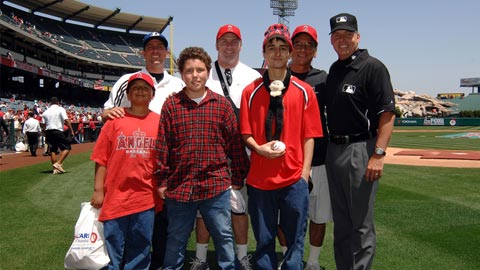 They are seen working in the community. Charlie T. RiverDog is seen all over the Lowcountry. Stories are told about how much fans love coming to The Joe and how much the local organization means to the area.
They are seen working in the community. Charlie T. RiverDog is seen all over the Lowcountry. Stories are told about how much fans love coming to The Joe and how much the local organization means to the area.
In that local spirit, the organization has announced a formal relationship with Lowcountry Local First for the 2011 season.
The mission of Lowcountry Local First is to advocate the benefits of a local living economy by strengthening community support for independent and locally-owned businesses and farmers.
 “We want to stress the fact that supporting local businesses helps to strengthen our local economy,” said RiverDogs general manager Dave Echols. “We are an active player in this region – whether we are in season or not – and we want to do all we can to help our local businesses. As a result, we hope that our fans will recognize the importance of supporting local businesses and artisans while at the same time allowing Lowcountry Local First members an opportunity to reach our fans, all while enjoying a night of relaxation and entertainment by attending a RiverDogs game.”
“We want to stress the fact that supporting local businesses helps to strengthen our local economy,” said RiverDogs general manager Dave Echols. “We are an active player in this region – whether we are in season or not – and we want to do all we can to help our local businesses. As a result, we hope that our fans will recognize the importance of supporting local businesses and artisans while at the same time allowing Lowcountry Local First members an opportunity to reach our fans, all while enjoying a night of relaxation and entertainment by attending a RiverDogs game.”
Part of the RiverDogs’ involvement with Lowcountry Local First will consists of locally owned businesses having the opportunity to provide information and promote awareness through various table displays near the entrance of Joseph P. Riley, Jr. Park on Saturdays.
Fans who come to the ballpark for Saturday home games will not only have the chance to interact with those local businesses, but if they show proof of residency in the Greater Charleston area, they’ll receive $1 off their ticket purchase upon entering The Joe.
Lowcountry Local First is an alliance that educates the public on the importance of supporting the local economy, and encourages businesses and consumers to be environmentally sustainable and socially responsible. They are the 44th network of the Business Alliance for Local Living Economies (BALLE), North America’s fastest growing network of socially responsible businesses that are comprised of more than 80 community networks representing 22,000 independent business members across 30 states and Canadian provinces.
These networks create local living economies through the building blocks of independent retail, sustainable agriculture, renewable energy, green building, local zero-waste manufacturing, community capital, independent media and local arts and culture.


 New York, NY- The Staten Island Yankees are among the more than seventy Minor League Baseball (MiLB) clubs participating in the 3rd Annual UMPS CARE Charities Online Auction. Fans can win luxury suites and blocks of 24 tickets at an incredible savings from 66% to 85% off of the retail value or gate price.
New York, NY- The Staten Island Yankees are among the more than seventy Minor League Baseball (MiLB) clubs participating in the 3rd Annual UMPS CARE Charities Online Auction. Fans can win luxury suites and blocks of 24 tickets at an incredible savings from 66% to 85% off of the retail value or gate price.




